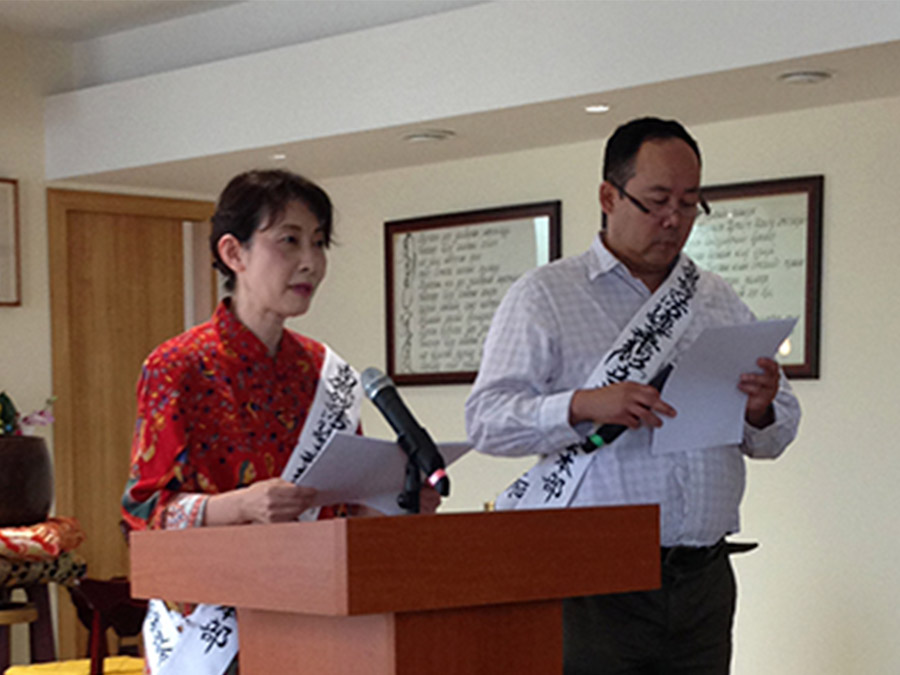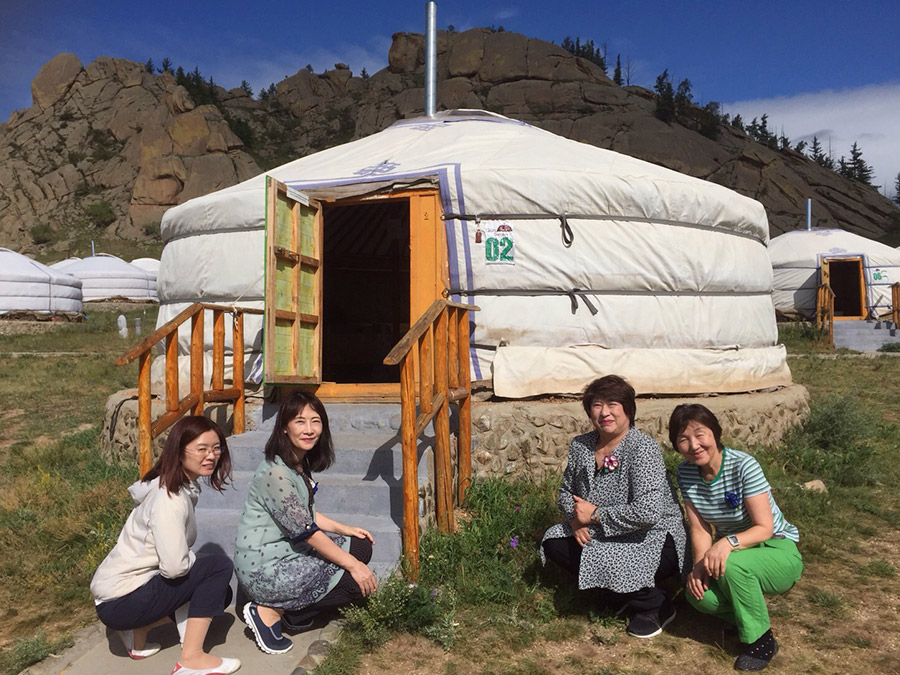This Dharma experience speech was delivered at the Ulaanbaatar Dharma Center in Mongolia on August 10, 2016.

Mrs. Murakami (left) delivers her Dharma experience speech as Mr. Zorigt (right) translates it into Mongolian.
I am Ikuyo Murakami, a chapter leader of the Shibuya Dharma Center in Tokyo. I first came here to Mongolia seven years go, so this is my second visit. Thank you very much for giving me this opportunity to share my spiritual experience with you today.
My parents and grandmother were earnest members of Rissho Kosei-kai, so I was grew up in a faithful family from my childhood. My father is an earnest and hard working man, and my mother is always smiling and very kind. I grew up in good circumstances and was able to live my life without any problems. When I went to the Dharma center, I was always able to meet with many friends And I went to the center every day, as we enjoyed the activities together.
However, from the seventeenth year of my marriage, many problems arose, and my suffering continued. My husband, who had been a salaried employee, suddenly quit his job. Soon after that, he opened a dance school, because dancing was his hobby. In addition, he only told me about the school three days after he had opened it. I was angry with him for not conferring with me. I was filled with feelings of blame for his actions, and anxiety over what would become of me. The dance school had to close one and a half years after it opened, because it was not making a profit. All that was left was a heavy debt.
I wanted to start working to sustain our living, but before I did, I visited the minister of the Dharma center for Dharma guidance. She said to me, “You should not work but come to the Dharma center instead.” I thought this would be was impossible; we were facing a debt so great we could not repay it, even if I worked extremely hard. So I decided to do diligent practice, following the minister’s guidance. Soon afterwards I received the role of the head of the Young Wives’ Group. I went to do tedori (visiting members’ homes and helping them enhance the connection with the Dharma) every day, practiced michibiki (the practice of connecting people with the Dharma) and hoza (the Dharma Circle).
My husband is a hard worker, working without taking days off on holidays, and he made a great effort to repay the debts. Even though he worked hard, the amount of the debt was simply more than we could repay, even if we would work through our whole lives. However, he would unexpectedly received large orders sometimes. Thanks to those orders, we were able to pay off the debts in a short span of time. I was very surprised that these kinds of things really happened. I practiced by following the minister’s Dharma guidance, and I really received the result of my practice. I learned the importance of practicing the Buddha’s teachings straightforwardly.
When I was feeling relief, having overcome this great distress, I had a traffic accident. I was seriously injured and needed to stay in a hospital for two months. My legs were broken, and rehabilitation was necessary after leaving the hospital. The rehabilitation process was very hard. But I strongly felt that I wanted to heal my injury and go to the Dharma center again. I kept this kind of positive attitude. Then I could feel grateful from the bottom of my heart to my husband, who would come to the hospital to see me every day.
Through the traffic accident, I felt that my life was saved and given to me by the Buddha. I was determined to serve the Buddha as his hands and feet.
Now, I have been a chapter leader for four years. The chapter that I have been assigned to is the largest one in the Shibuya Dharma Center. So the chapter has so large a membership that I am very busy taking care of the members. Wishing to devote my life to liberating each one of the members, I visit the members’ homes to do tedoriwith seven area leaders every day, and share the teaching of the Dharma with them. The members have many kinds of anxieties. Every time I visit to do tedori, I stay close to the members, listening to their sufferings. I take their sufferings as my own, feeling sympathy for them. Through their suffering, my perspective changes from a self-centered point of view to the Buddha’s one. However, I always ask the minister whether my attitude toward the members was correct at the chapter leaders’ meeting. The chapter leaders mutually learn how to accept the members’ problems and practice through them.
For example, sometimes members would neither listen to me, nor accept what I had to say, when I tried to persuade them to do something during the tedori. In that situation, I quickly changed my mind. It was because I considered the problem of a member to be his or hers, and I didn’t take the problem as my own. I reflected that I was not one with the members and had beenslistening to them with my self-centered mind, and I changed myself. Then I made the connection with them once again, considering their feelings.
The minister always continues to pray for me until I can understand what she says. Recalling her compassionate mind, I also continue to pray for the members’ buddha-nature. By applying the teaching of the Buddha, I make an effort to grasp the message that the Buddha is trying to teach me. When I can understand the message, I am so moved. At the same time, the member before me also realizes the message from the Buddha, saying, “I understand. I was suffering because my mind was self-centered.” Their face becomes bright and we rejoice together. I share their kind of joy with the members of my chapter every day.
I receive the guidance from the minister about the Buddha’s point of view and the way of accepting it, and I bring it back to the chapter, where I share it with the area leaders and put it into practice.
Some of the seven area leaders are very busy with regular work ,or caring for their parents, but they make time for fulfilling their roles at the Dharma center. Among them, Ms. A is making the greatest effort. She has such weak eyesight that she cannot recite the Kyoten (Sutra Reading) without bringing her eyes close to it. Although she can see nothing at her feet, she walks to disseminate the teaching earnestly. I am moved by seeing her. She has experienced many hardships and she talked about them in her testimony in June this year. She had taken care of her parents-in-law before. Taking care of the aged parents at the same time must have been really hard on her, considering her weak eyesight.
Her husband had been busy with his work and couldn’t join with her in caring for his parents, so she had been lonely. Because of this loneliness and stress, she started to buy jewelry. At the time, she was temporarily relieved from stress and loneliness brought by the having to be a caregiver, and she felt happy. She repeated this behavior again and again, and the payments for the jewelry increased. She could not repay them by herself. At last, she had to use all of a large amount of deposited money that she had been holding for the parents-in-law.
Her husband forgave her, even though he knew what she had done, so they didn’t divorce. Her husband is a really kind and warm-hearted person. Ms. A sincerely apologized to him and repented to the parents-in-law. The problem of the debt was solved by renouncing the property left from the parents-in-law, instead of the settlement of debts.
Thinking, “I have become the kind of wife who is pleased by my kindhearted husband! I must make the parents who have passed on happy, by showing reverence for our ancestors,” she received the role of an area leader and walks to do tedori. Now she is making an effort with a great aim of giving generosity. I learned from her, a person who has changed her mind through repentance and who steadfastly practices the teaching.
This time, I have been given an opportunity to share my spiritual experience with you in Mongolia. I reflected on my whole life as I was making a draft of this spiritual experience. I was born and raised in a faithful family but I was satisfied with that environment. I had a wish to do something good for others, but I had been absorbed in my own happiness. The Buddha gave me many kinds of sufferings, implying, “You should become a bodhisattva who can stay close to others who are suffering and liberate them.” The Buddha showed me various kinds of phenomena. Thanks to the Buddha’s compassion, I am the kind of person that cannot leave suffering people unattended, and that can be delighted with others’ happiness as if it were my own. I am grateful now to the minister and the sangha members for their support.
Today is a monthly memorial day of Cofounder Myoko Naganuma. Cofounder Naganuma established Rissho Kosei-kai together with Founder Nikkyo Niwano. Because of her compassionate heart and mind, she was loved as the compassionate mother by the members. She proved at the risk of her life that the Founder’s teachings were correct. The Sasahata Chapter that I am responsible for includes an area of Hatagaya, where the Cofounder used to run a baked sweet potato stall. So, Sasahata is a meaningful area in which the Cofounder had lived. I always keep in mind my wish to become a chapter leader who guides people in a compassionate manner like the Cofounder.
By making my mind one in spirit with the Mongolian members, even though I live in a different country, I would like to spread this wonderful teaching to many people. I devote my life to liberating the members and being diligent in my practice of the teaching to be a charming person.

Mrs. Murakami (second from left) with the minister (second from right) and other members of the Shibuya Dharma Center from Japan in front of their accommodations.